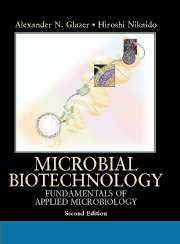Book contents
- Frontmatter
- Contents
- Preamble
- Acknowledgments
- 1 Microbial Diversity
- 2 Microbial Biotechnology: Scope, Techniques, Examples
- 3 Production of Proteins in Bacteria and Yeast
- 4 The World of “Omics”: Genomics, Transcriptomics, Proteomics, and Metabolomics
- 5 Recombinant and Synthetic Vaccines
- 6 Plant–Microbe Interactions
- 7 Bacillus thuringiensis (Bt) Toxins: Microbial Insecticides
- 8 Microbial Polysaccharides and Polyesters
- 9 Primary Metabolites: Organic Acids and Amino Acids
- 10 Secondary Metabolites: Antibiotics and More
- 11 Biocatalysis in Organic Chemistry
- 12 Biomass
- 13 Ethanol
- 14 Environmental Applications
- Index
- Plate section
Preamble
Published online by Cambridge University Press: 05 June 2012
- Frontmatter
- Contents
- Preamble
- Acknowledgments
- 1 Microbial Diversity
- 2 Microbial Biotechnology: Scope, Techniques, Examples
- 3 Production of Proteins in Bacteria and Yeast
- 4 The World of “Omics”: Genomics, Transcriptomics, Proteomics, and Metabolomics
- 5 Recombinant and Synthetic Vaccines
- 6 Plant–Microbe Interactions
- 7 Bacillus thuringiensis (Bt) Toxins: Microbial Insecticides
- 8 Microbial Polysaccharides and Polyesters
- 9 Primary Metabolites: Organic Acids and Amino Acids
- 10 Secondary Metabolites: Antibiotics and More
- 11 Biocatalysis in Organic Chemistry
- 12 Biomass
- 13 Ethanol
- 14 Environmental Applications
- Index
- Plate section
Summary
Il n'y a pas des sciences appliquées … mais il y'a des applications de la science. (There are no applied sciences … but there are the applications of science.)
– Louis PasteurMicroorganisms are the most versatile and adaptable forms of life on Earth, and they have existed here for some 3.5 billion years. Indeed, for the first 2 billion years of their existence, prokaryotes alone ruled the biosphere, colonizing every accessible ecological niche, from glacial ice to the hydrothermal vents of the deep-sea bottoms. As these early prokaryotes evolved, they developed the major metabolic pathways characteristic of all living organisms today, as well as various other metabolic processes, such as nitrogen fixation, still restricted to prokaryotes alone. Over their long period of global dominance, prokaryotes also changed the earth, transforming its anaerobic atmosphere to one rich in oxygen and generating massive amounts of organic compounds. Eventually, they created an environment suited to the maintenance of more complex forms of life.
Today, the biochemistry and physiology of bacteria and other microorganisms provide a living record of several billion years' worth of genetic responses to an ever-changing world. At the same time, their physiologic and metabolic versatility and their ability to survive in small niches cause them to be much less affected by the changes in the biosphere than are larger, more complex forms of life. Thus, it is likely that representatives of most of the microbial species that existed before humans are still here to be explored.
- Type
- Chapter
- Information
- Microbial BiotechnologyFundamentals of Applied Microbiology, pp. xiii - xviPublisher: Cambridge University PressPrint publication year: 2007



